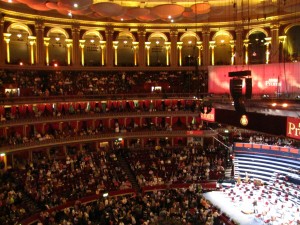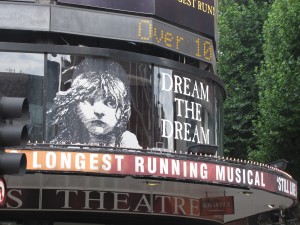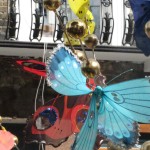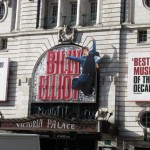September 14th, 2010 · 1 Comment
When President Durden asked us whether we had seen any aspects of London that changed our views of what we want from life, I, like many others, thought of the fantastic access to the arts here. This has been manifested for me in all of the free museums and especially in the reasonable prices of theatre tickets on the West End. I came to London knowing that I wanted to go the theatre as much as possible, and I set aside a significant portion of my meager summer earnings (unpaid internship–ouch) for that purpose. I’ve been lucky enough to see five shows in London so far: The Merry Wives of Windsor, Billy Elliot, Bedlam, Les Miserables, and The 39 Steps. Although I sat in the very back row of the theatre for Les Mis and had a railing in my line of sight during Billy Elliot, I was able to purchase tickets for twenty pounds and twenty-seven pounds, respectively. If I tried to see so many shows, especially big name musicals, in the States, I would probably have no money left, so that’s been really fantastic.
I’m fairly predisposed to like theatre productions (I kind of enjoyed Bedlam, actually), but since hearing Rick Fisher speak I’ve started to evaluate the nature of the shows that I’ve seen differently, especially the two musicals. Les Miserables and Billy Elliot both draw in a lot of tourists, but I had very different reactions to these two shows. Les Mis is an epic show; there’s no other way to say it. It’s full of famous numbers that showcase the performers’ abilities to belt out big choruses and really high notes, one song after another. There are incredible set pieces and dramatic lighting cues up the wazoo. It’s an extremely showy piece. I don’t want to call it glitzy because so much of the drama comes from the violent deaths of various characters, but I think that it’s very aware of what audiences want. This is not a bad thing at all, and it certainly seems to have worked for the production. Personally, though, I found it hard to connect with the emotion of the show because I was just waiting for the next show-stopping number and Rick Fisher’s voice was in the back of my head. I thought that it was indulgent and Hollywood-esque, and once or twice I thought, “So these are a bunch of British actors performing in a show that aks me to glorify France…what?” I had trouble connecting with the show, although I did enjoy it.
Part of my reaction may have stemmed from the fact that I had just seen Billy Elliot, which I absolutely fell in love with. Unlike Les Mis, Billy Elliot doesn’t focus on showstoppers so much. I didn’t feel like it was trying to be anything that it wasn’t–it was a more honest story. Although it doesn’t have the violence of Les Mis, it’s a grittier play because there aren’t gorgeous sets or big songs for performers to belt out. The show focuses more on telling the story at hand, the story of a young boy struggling to be himself amidst the coal strikes in northern Engalnd during the Thatcher era. Because it wasn’t as pretty as Les Mis, I thought that the emotions communicated in Billy Elliot were more raw and easier to conncet with, to the point that I shed some tears during a few points in the performance.
The honesty that I loved in Billy Elliot was definitely embodied in this afternoon’s performance of The 39 Steps, which I loved. To work as a spoof, the show had to be completely aware of where it was coming from, and it also couldn’t pretend to be anything bigger than it was. I thought that the show successfully took on not only the Hitchcock movie, but also theatre and Englishness in general. It was almost as though Kate Fox was consulted on the rules of Englishness while the play was being adapted. Think of the two men in the train who were constantly saying, “‘Scuse me, sorry! Sorry, ‘scuse me!” The entire show was about being able to laugh at oneself and at the national character. Based on Kate Fox’s descriptions, I thought that it was just so English. And we saw it in a beautiful, intimate theatre, which definitely contributed to the atmosphere. I thought that it was hilarious and very well-performed.
So, Les Mis disciples, please don’t hate me because I really enjoyed that show, but I found the emotional and/or comedic honesty of the other two shows more easily accessible.
Tags: 2010 Holly · Theatre
September 7th, 2010 · 1 Comment
… So far.
During the two weeks in London, I have so far had the opportunity to see a variety of shows, which have offered different perspectives of theatre culture in England.
First, there was The Merry Wives of Windsor at The Globe. As a groundling after a long day exploring the city, my feet were exhausted by my excitement levels were through the sky (well, higher than usual, as they tend to be at somewhat extreme heights in general). Seeing Shakespeare performed at The Globe was an incredible experience for many reasons. Not only was the performance one of the best live productions that I have seen, the theatre’s atmosphere was almost indescribable. It was almost if everyone had traveled to the turn of the 17th century. Usually, everyone is quiet during the performance and politely respectful of the performers. While this was the case, the audience seemed more willing to shout, cheer, and laugh uncontrollably at the events on stage. Being so close to the stage, the magic of the actors radiated from the stage and created an atmosphere unmatched by any performance thus far. The added music also added to the atmosphere- an Early Modern theatrical experience would have had the pre-show performers and would have been completely different from what we are used to. The performance was as close to replicating that experience as possible in our modern world. Afterwards, we were able to thank some of the actors and they seemed sincerely grateful that we said something- an idea that would be challenged later.

Next came the Proms at Royal Albert Hall. While The Globe was magical, Proms was one of the most equalizing of the performances because of how accessible they were. In the States, every classical concert I have been to has been a stuffy affair. There, the celebration of the music was open and everyone seemed to be unified in their desire for good music (which the audience should not have been disappointed with). The biggest issue I had with the Proms was the incessant coughing. Usually people try to hold their coughs, but when one or two people cough at during movements, it doesn’t provide an excuse for everyone to cough uncontrollably to prove they can and that they are not going to do disrespect the musicians by coughing during the performance. I would like to go back to Proms to see if it is a bizarre tradition or if that night was a fluke.

Royal Albert Hall
My following experience was Billy Elliot, which I have already blogged about, so I’ll try not to be redundant here. Other than being my first big West End experience, it was also important because it showed a lot of the themes of our course in a new light. Instead of applying the themes to the immigrant communities, it showed the themes in terms of a distinctively native English story. Furthermore, it also highlighted two differences between English and American theatre in particular. Firstly, we aren’t used to paying for our programs in the States. As an avid theatre goer, I’m used to being handed a Playbill (or regional equivalent) and continuing into the theatre. I don’t have to wonder who the cute guy playing a certain character is or why so and so looks so familiar. I don’t mind paying an extra three quid when I’m paying half of what I’m used to paying, but it definitely caught me off guard. Secondly, the tradition of stage door here is (as far as I’ve gathered) practically non-existent. In NYC, it is fairly common to wait after the show at the stage door to thank the actors for their performance, get an autograph, and if you are lucky, a photograph. (Yes, this can be a weird experience, but it can also be a great one.) When we went after Billy, it was completely different. While there were people there, the actors went by ignoring everyone. After Holly mentioned it, I realized that this was indeed a representation of the English concern for privacy and social dis-ease. On stage, the actors are free from interacting with the strangers feet away from them. At the door, they are in a different type of spotlight. Yet, the boundaries between personal and private life would not intersect. They are still technically at work. The guys from The Globe seemed to enjoy that we acknowledged them. I can’t wait to try another stage door experience to see the difference. (I planned to try again after Les Mis, but it was raining…)

The Victoria Palace, Home of Billy Elliot
Next came Bedlam, back at The Globe. For the first play by a woman performed there, the show was interesting. I’d like to say it succeeded it my expectations (which weren’t that high), but it didn’t. It did meet them, but something about the show was lacking the magic of the first show we saw there. At the end of the first act, I wasn’t at all satisfied, but by the end of the second, it had redeemed itself. I’d like to blame this all on not being a groundling and therefore surrounded by the audience members and the actors. I did enjoy it but it was not my favorite by any stretch.

The Globe, A View From Above
Lastly (thus far) is Les Miserables. One of my favorite musicals, I thoroughly enjoyed it. Despite the fact Marius has a slight bald patch, the actors were outstanding. (Even Norm Lewis, who I have seen in another musical and was THOROUGHLY disappointed in then, was outstanding. His awkward- but commanding- stage presence was perfect for Javert.) A truly equalizing musical, I was not surprised to see people in blue jeans and others in formal dresses. The difference is interesting when considered in the context of the musical and its equalizing themes. Theatre in London is truly for everyone- no matter one’s status. Seeing the opposites in dress at this show hit me as strangely appropriate. (I don’t want to elaborate knowing that some of you guys have yet to see it. So, I’ll just leave it at that.)

So far, I’ve thoroughly enjoyed my experiences at the theatre and can’t wait for more. I’m hoping to see Wicked (my favorite, in case you have missed that slight detail) and Blood Brothers at the very least. While technically not theatrical, I also expect my experiences at the various football matches I’m planning on going to to be worthy of a theatre stage!

Tags: 2010 Stephenie · Theatre
The Notting Hill Carnival was not what I expected, but at the same time did meet some of my expectations. The ones it met: the drinking/party atmosphere (it also exceeded this one by a lot) and excellent food. The parade disappointed me; I was expecting more cultural representation and differentiation. Instead, I found it to be lacking. My initial reaction was, “Okay. This is different, but cool.” By the third “float,” however, I found them to redundant. The costumes were gorgeous, but some of the marchers should have rethought their costume decisions. Coming from a family that loves parades- we watch every Thanksgiving Day & Rose Bowl parade together- I was expecting different floats, all intricately designed and reflective of the culture of the community who put that float together. Instead, it was mostly people in sequined and glittery costumes walking behind a big truck (or double decker bus) that was playing loud music- some of which was American. I was hoping for a cultural learning experience, not a chaotic drinking party in the middle of the day posing as a cultural experience. Setting aside the drunkard-dodging and remixed American music, I enjoyed the carnival for the experience it offered; it was definitely a chance to observe the English in what Fox referred to as a “liminal” space. In different ways, I felt that people were more relaxed and open to just enjoying the experience. The typical English reserve seemed to be greatly diminished (among the sober and definitely not sober). It was a great overall experience, but I don’t think I would go to the Carnival in the future.
-

-

Billy Elliot, however, exceeded all of my expectations. It is something I wanted to see while I was here, but I never expected it to tie Wicked for my favourite musical. (Note: I’m a bit obsessed with Wicked. You probably don’t want to mention it in a 10 foot radius of me if you don’t want to get into a lengthy discussion.) About a young boy who discovers that he is a talented dancer and decides he wants to dance for life, the story concentrates on several of the topics we have (or will) discuss will discuss in class, including labor strikes, class, and the government. Throughout the entire musical, class is an issue. For the miners in Billy’s community, dancing isn’t something done. A male dancer is a “poof” not to be taken seriously. A career as a miner and providing a steady income for one’s family is the most respectable option. Billy’s dad is dead set against Billy dancing, but when he realizes he is so talented and can’t help but dance, he decides to go back to work in the mines. (They’ve been in the middle of a mining strike.) Breaking the strike drives a wedge between him and his older son, Tony. The representation of community in the musical, especially among the miners despite their hardship, is an excellent example of the way our readings have mentioned communities coming together. Furthermore, seeing this community on throughout their strike adds a human dimension that our readings could not express. It brought the stats to life for me, which is something that I normally look to art to do. The musical also touches on Thatcher’s government & the way that it reacted to the strike to break it. (“Merry Christmas Maggie Thatcher” had to be one of the most hilarious and poignant scenes in the entire musical, giving an excellent representation of how elitist that government seemed.) I could go on forever on the way that it relates to class. It’s an excellent musical that I think everyone should see. There is something for everyone in it, especially as we all consider the diversity of London, the struggles of labor, and the English class system.
Tags: 2010 Stephenie
August 30th, 2010 · 1 Comment
Today I saw two very, very different sides of “Britishness,” one at the Notting Hill Carnival and the other at a West End performance of Billy Elliot. I was under the impression that the Notting Hill Carnival was supposed to celebrate the West Indian cultural heritage of the immigrants who came to the Notting Hill area in the 1960s and onward, but barr a lot of flags and glitter, I sort of missed the cultural celebration part. I got the celebration, definitely, but I was expecting much more emphasis on West Indian music, crafts, etc… Instead I heard a lot of American rap, dodged a lot of people drinking, and saw too many people wearing spandex and feathers who should really have rethought the spandex. Really, really rethought the spandex. Don’t get me wrong–the costumes in the parade were absolutely stunning, and the food was fantastic. It just seemed as if culture was put on the backburner so that drinking and partying could dominate the day. Kind of like Saint Patrick’s Day in America–a bunch of people dig up their Irish heritage (or fake their Irish heritage) in order to drink more for the day. Definitely very interesting to see, but kind of disappointing as a cultural learning experience.
Directly after leaving the carnival, however (which took some fancy navigating), I went into the West End to see Billy Elliot, which was so many types of amazing. As I was watching the show, I was struck by what a different type of cultural celebration it was–it concentrated exclusively on British working-class culture, particularly in Northern England. Stephenie, Matt, and I were talking during intermission about how much we could tie our readings into the show’s themes, and also about how we were really enjoying seeing a show that was so “British.” Lee Hall, who wrote the screenplay for the film with Jamie Bell and then adapted it to the stage, had a piece in the program in which he talked about how creating a show that was true to the working-class culture that he came from. We’ve concentrated a great deal on immigrant populations to England, which is definitely an important and dynamic topic, but we haven’t really addressed white British culture too much. Billy Elliot centers around the coal miners’ strike during the Thatcher era and, allowing for theatrical exaggeration, is a really interesting look into the lives of working-class families in that situation. Some of the themes presented in the play really resonate with our readings, as well. Billy, a twelve year-old boy, wants to break with the family tradition of coal mining by going to ballet school, so his family has to learn to cope with his aspirations. His older brother spends an entire scene talking about keeping the family together and how hard it is to uphold family values in the face of economic desparity and change, which somewhat mirrors the immigrant experience. It’s a different look at what was happening in England during the 1980s, and I found it really interesting. It opened up the picture of British identity a bit more. And the music and choreography were stunning. I think that I overused the word “fabulous” by quite a bit. Yes, it’s touristy, but it’s an amazing show and could also be used as an interesting counterpoint to our discussions of immigration. Just be prepared to be singing the songs for a few days afterward.
Tags: 2010 Holly · Theatre · Uncategorized








